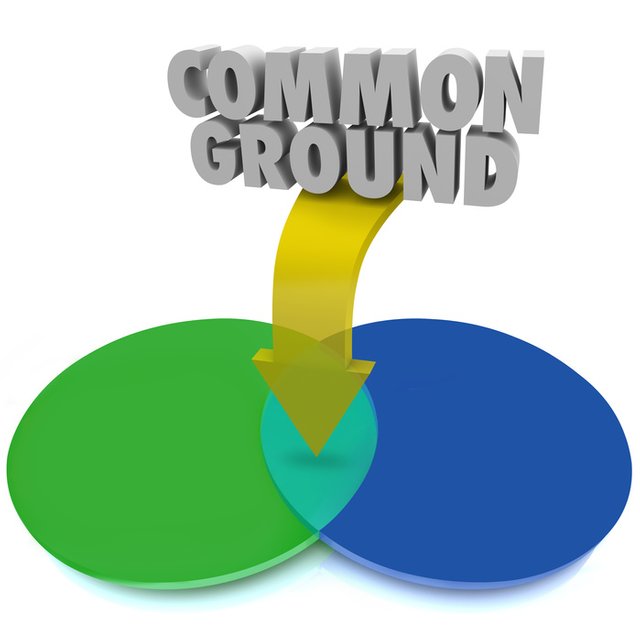Radically Different Solutions to Common Goals

It is nice to find common ground with anybody, but when I find common ground with a staunch socialist this is a rare treat. Poverty is one such area where I can find common ground. Of course I would like to see less poverty in the world. Of course I would like it if poverty was unheard of. The divergence between myself and the socialist occurs when it comes to the application of a solution. The socialist will point to the wealth disparities in the world and advocate an enforced 'divvying up' of the wealth to a proportion deemed to be fair as surely the best solution. Whereas I will advocate that we allow new wealth to be created by way of unrestricted opportunities for everybody so that those who find themselves in poverty are able to earn their way out of it. Private charities also have an important role to play.
Many of the proposed socialist solutions to poverty, although well-meaning, exacerbate the problem. Minimum wage laws for instance are proposed with the noble goal of preventing exploitation, whereas unrestricted competition prevents exploitation quite naturally. If the free market were left to be unhampered then the price of labour would be 'bid up' by competing employers seeking to run a profitable business. In practice, minimum wage laws restrict unskilled workers from entering the market and then what occurs? Those unskilled workers miss out on the opportunity to learn a new skill and find themselves having to choose between less desirable options. Many who find themselves in this position who reside in an area where there is a welfare system will turn to it. This is where the enforced divvying up of the wealth occurs.
What I advocate is radically different to this in that the total wealth on the planet should be allowed to increase. Instead of advocating a system of enforced divvying up of wealth which is already in existence, new wealth should be allowed to be created, by way of a completely unhampered free market. Trade is a win-win when both parties enter in to it voluntarily, else they would not agree to the trade. Each must value that which they are receiving greater than that which they are giving up, else they would not voluntarily give it up. In other words they both become richer once the trade completes according to their own values.
Those who are born in to wealthy families are done so by pure happenstance as is the case for those who are born in to poorer families. The poor are as entitled to the property (or wealth) of the rich as much as the rich are entitled to the property of the poor i.e. without uncoerced consent they are not. Any sense of moral entitlement for some to receive the property of others by way of force is more likely to be an act of jealousy or ignorance rather than that of a reasoned moral stance. This is the case irrespective of how extreme the wealth disparities may be.

In my experience there are many who hold a feeling of resentment towards those who are born in to wealthy families. The creator of the above meme appears to be drowning in resentment. The reality here is that nothing other than happenstance has ocurred and thus any feeling of resentment is grossly misplaced unless something unjust has occurred. Happenstance is not a crime. Happenstance is not unfair. Wealth disparities, in and of themselves, do not represent injustice.
It is right to tackle poverty. A system of enforced divvying up of wealth is one proposed solution, but it is an abuse of private property rights and in practice it doesn't solve the problem, it exacerbates it. It is like trying to put out a fire using petrol. A better solution to solving poverty is new wealth creation, not an enforced rearrangement of existing wealth. We have tried the latter to death, quite literally.
Well said and you included a point which I have thought about quite a bit for a while now, which is that being born in the wealth extremities is a matter of chance and resenting those "spoiled" or born in wealth is indeed misplaced. Counterproductive, in-fact.
I feel like people should focus instead on realizing that life is just a bunch of random chance and that's no reason to resent others born better off than you. So yes, it is unfair at times. But what can you do to surmount your struggle or to improve your situation and those of others who are in a similar position?
Simply refusing to change, overcome, and believe that nothing you do is going to matter, get's you no where. When you begin to change you begin to realize that everything is possible; and not only are you leading your way to a better life but you are paving a road for others around you... Unless you choose to isolate yourself I guess.
Thank you for your comment. You seem to agree with me but when you said, "So yes, it is unfair at times", you chose to use the word "unfair", which my post explicitly made the opposite point. I would like to clarify whether you agree with me on this point or not?
I suppose in your context if something was unfair then the feeling of resentment is justified, so "Happenstance is not unfair." or random chance is never unfair. So yeah I used it incorrectly here. I just meant to use it to illustrate the difference between two things, but I should probably have chosen another word